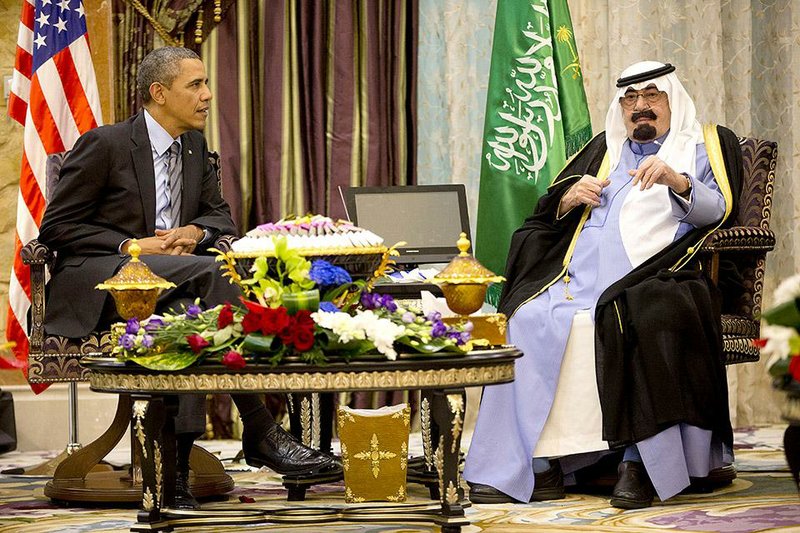In the late 1980s, a U.S. diplomat in Riyadh went to ask a small favor from then-Crown Prince Abdullah, who replied, "A friend who doesn't help you is no better than an enemy who does you no harm."
For much of President Barack Obama's presidency, however, Saudi Arabia has wondered whether the United States had fallen into the category of an unhelpful friend.
Diplomats say that King Abdullah, who died Thursday, had been angry in recent years at Obama's failure to topple Syrian leader Bashar Assad, was disappointed with the lack of U.S. pressure for an Israeli-Palestinian settlement, and anxious about whether U.S.-led nuclear talks with Iran would lead to a rapprochement between the United States and Saudi Arabia's main rival.
But U.S. officials say that over the past few months, ties between Washington and Riyadh have warmed again, bolstered by an Obama visit to the Saudi capital last March and, more importantly, by both countries' overriding focus on blunting the rise of the Islamic State extremist group, also known as ISIL.
On Tuesday, Obama will stop in Riyadh again, this time on his way back from a trip to India, to pay his respects and firm up ties to the new King Salman.
"The relationship is on a sound track," said a senior administration official. "I don't want to paint a picture of complete harmony. They want us to be more aggressive on Iran. They want us to be more aggressive in Syria," he said. But, he added, "I think on both sides there has been an evolution. I think the threat of ISIL has certainly brought the two countries together."
He said that during a December visit by Prince Mohammed bin Nayef, the Saudi internal security chief, "there was no obvious difference of views" and "on issue after issue we have been able to agree on a way forward."
The United States needs help from Saudi Arabia, home of the extremist Wahabi strain of Islam, in tracking down terrorists and choking off funding to militant jihadist groups. And as the world's largest crude oil exporter, Saudi Arabia's stability is critical for the world economy. Saudi Arabia needs U.S. help to protect its vast oil infrastructure and shipping lanes for its oil tankers.
Recently, Saudi fighter jets have taken part in bombing raids against Islamic State forces. And the government has hunted down returning Islamic State fighters, while preaching a more moderate brand of Islam to head off recruiting efforts by extremist groups.
The emergence of a new common foe, however, might not be the best way to rebuild a relationship, especially since the foe has emerged from Iraq. Abdullah had opposed the U.S. invasion of Iraq, but when President George W. Bush asked him to let U.S. forces use northern Saudi Arabia as a staging area, Abdullah granted the favor.
Since then, say some former American diplomats, the relationship with the kingdom has changed, from one in which favors, mutual understanding and personal ties play important roles, to one composed of case-by-case requests, so that the Obama administration can in the space of a month host a leading Saudi prince, condemn a public lashing and then praise Saudi cooperation on fighting the Islamic State.
"Now everything is transactional," said Chas Freeman, a veteran diplomat who was U.S. ambassador to Saudi Arabia under President George H.W. Bush. "The Saudis now ask: What's in it for us? Everything is one-off. There is a fundamental shift in the relationship."
For most of the Obama presidency, U.S.-Saudi relations have been marked by tension, having mostly to do with Obama's handling of the Syrian civil war.
Abdullah was angry that Obama didn't do more to overthrow Assad, punish the Syrian regime for using chemical weapons in the conflict or give guns to the Syrian rebel groups.
"The irony is that the genuine, legitimate and moderate opposition -- which Saudi Arabia would like to see supplied with defensive weapons which the West continues to deny them -- is now fighting both Assad's forces and their allies from Shiite forces on one side and the so-called Sunni jihadists al-Qaida fighters and other bloodthirsty irregulars on the other," Prince Turki al Faisal said in a London speech in May. "This is a shameful situation and a dark blot on the moral standing of the world."
Abdullah also broke openly with the United States over Egypt, deploring the lack of U.S. support for the Mubarak regime. Later, when the Obama administration cut aid to Egypt, Saudi Arabia pledged to provide the lion's share of a $12 billion Gulf aid package to help new Egyptian leader Gen. Abdel Fattah el-Sissi, who had ousted an elected Muslim Brotherhood government.
Obama's March 28 visit came amid these tensions. "It was less intended to accomplish something than to preclude bad things from happening," said Freeman, "and I think it worked on that level. There had been a whole series of Saudi statements criticizing the United States. That is not the Saudi style that we know."
Saudi Arabia has also feared that a deal on Iran's nuclear program could lead to a warming of U.S. relations with its rival Iran, and that prolonged negotiations might sap U.S. desire to confront Iran as it expands its influence in Beirut, Baghdad, Damascus and Sanaa.
A Section on 01/25/2015
